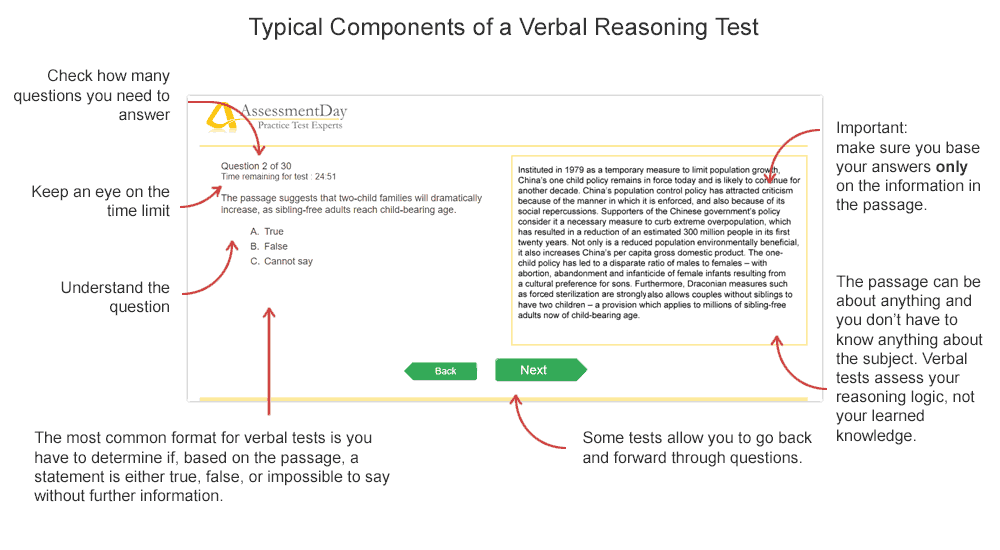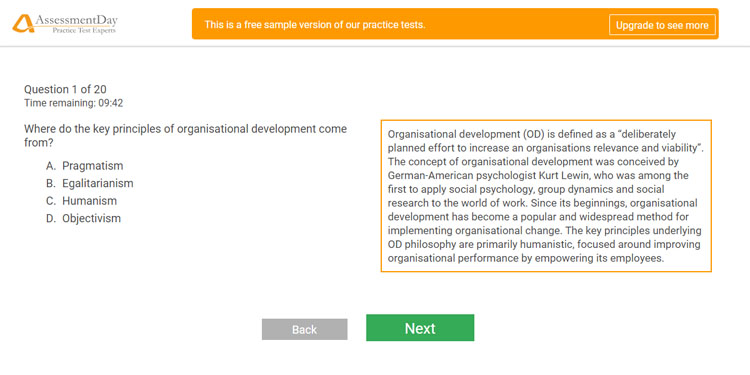Reading Comprehension Tests
Practice tests, solutions, and tips to help you pass employers' reading comprehension tests.



Updated:
Page contents:
Jump to:Looking to hire?
We recommend Test Partnership for companies seeking reliable hiring tests.

What is a reading comprehension test?
A reading comprehension test is an assessment designed to measure a person's ability to understand written text. It typically consists of a passage of text followed by a series of questions that assess your understanding of the content, main ideas, and details presented in the text.
Reading comprehension tests may also be called verbal comprehension tests. Employers may use reading comprehension tests as part of the hiring process to evaluate applicants' ability to read and understand written instructions, reports, or manuals.
This will be undertaken under timed conditions and the candidate will have to read the passage quickly, and answer the questions accurately.
The following screenshots show the format of typical reading comprehension questions:


What's the format of a reading comprehension test?
Reading comprehension tests typically consist of a passage of text followed by a series of questions related to the content of the passage. You should not use any outside knowledge of the subject matter, only base your answers on what is written in the passage. The purpose of the test is to assess your ability to understand and analyse written information.
The length of the passage can vary, especially depending on the type of question being asked. The content of the passage can be on any topic, from science to history to literature.
The questions that follow the passage can come in different formats, but some common types include:
- Multiple choice questions: These questions provide a list of options, and you must select the correct answer from the choices given.
- True or false questions: These questions ask you to determine whether a statement about the passage is true or false.
- Short answer questions: These questions require you to provide a brief answer in your own words, they will typically be one-word answers.
- Matching questions: These questions ask you to match a term or concept from the passage with its definition or description.
- Open-ended questions: These questions require you to provide a detailed response in your own words, often asking you to analyse or interpret the passage.
Free practice reading comprehension tests
Free Reading / Verbal Comprehension Test
FreeThis free verbal comprehension test contains 20 questions. You will have 30 seconds per question in which to correctly answer as many as you can.
Verbal Comprehension Test 1
Premium- 30 questions
- 30 mins
Verbal Comprehension Test 2
PremiumVerbal Comprehension Test 3
PremiumVerbal Comprehension Test 4
PremiumReading comprehension tips and advice
Here are some recommendations and practical tips to help you perform at your best for your verbal comprehension test:
- Skim and scan the passage: One way to quickly get an idea of what the passage is about is by skimming through it. Skimming involves quickly scanning the passage to get a general idea of the content, including the main topic, key ideas, and important details. This helps to set the stage for a deeper understanding of the passage. Scanning, on the other hand, involves looking for specific information, such as names, dates, or statistics. This is especially helpful when answering questions that require you to find details in the passage.
- Take (mental) notes: Making mental, or physical, notes of things as you read can be incredibly helpful for improving your comprehension. Remembering key points or summarising each paragraph in a few words can help you to remember the important details of the passage. By actively engaging with the text, you'll retain more information and be better prepared to answer questions about it.
- Practise, Practise, Practise: To improve your reading comprehension, it's important to keep practising this reading comprehension skill by using practice assessments. Exposure and repetition will improve your skills - there is no better way to improve than by practising.
BONUS TIP
As you read, ask yourself questions about what you're reading, such as "What is the author trying to say?" or "Why is this information important?" This will help you to stay focused and alert as you read, which will improve your comprehension.
Start practising quality tests with a free account
Practice makes perfect
- Learn from detailed solutions
- Track your progress
